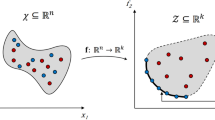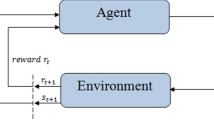Abstract
This paper considers a classic model of weighted single machine scheduling problem and aims to improve it to a real-world application through fuzzy set theory. For this purpose, processing times and due dates of jobs are defined as fuzzy numbers. In the proposed model, two objectives are considered to be minimized: average tardiness and number of tardy jobs. The objectives are converted into fuzzy statement through fuzzy arithmetic. Because the problem is NP-hard, it is proposed to solve the model through three well-known meta-heuristic algorithms as Simulated Annealing, Tabu Search, and Genetic Algorithm albeit with some modifications. Comparative analysis of algorithms is attainable through different experimented results on generated benchmark problems with different sizes and difficulties. Efficiency of the developed algorithms is analyzed on the different versions of the model which come from the assumption of different parameters and/or components. Algorithms' behaviors to managerial insights are also considered in some sensitivity analysis experiments. The obtained results show the applicability of the proposed model in real-world scheduling problems.
Similar content being viewed by others
References
Pinedo M (2002) Scheduling: theory, algorithms, and systems, 2nd edn. Prentice Hall, New Jersey
Nagar A, Haddock J, Heragu S (1995) Multiple and bi-criteria scheduling: a literature survey. Eur J Oper Res 81:88–104. doi:10.1016/0377-2217(93)E0140-S
Zadeh LA (1965) Fuzzy sets. Infect Control 8:338–353. doi:10.1016/S0019-9958(65)90241-X
Ishii H (2000) Scheduling problems with fuzzy constraints. In: Słowiński R, Hapke M (eds) Scheduling under fuzziness. Physica, Heidelberg, pp 81–112
Dong Y (2003) One machine fuzzy scheduling to minimize total weighted tardiness, earliness, and recourse cost. Int J Smart Eng Syst Des 5:135–147. doi:10.1080/10255810305049
Wang C, Wang D, Ip WH, Yuenc DW (2002) The single machine ready time scheduling problem with fuzzy processing times. Fuzzy Sets Syst 127:117–129. doi:10.1016/S0165-0114(01)00084-7
Han S, Ishii H, Fujii S (1994) One machine scheduling problem with fuzzy due dates. Eur J Oper Res 79:1–12. doi:10.1016/0377-2217(94) 90391-3
Duenas A, Petrovic D (2004) A new approach to multi-objective single machine scheduling problems under fuzziness. In: Proceedings of IFIP International Conference on Decision Support Systems, Prato-Italy, pp 223–232
Chanas S, Kasperski A (2001) Minimizing maximum lateness in a single machine scheduling problem with fuzzy processing times and fuzzy due dates. Eng Appl Artif Intell 14:377–386. doi:10.1016/S0952-1976(01)00011-2
Chanas S, Kasperski A (2003) On two single machine scheduling problems with fuzzy processing times and fuzzy due dates. Eur J Oper Res 147(2):281–296. doi:10.1016/S0377-2217(02)00561-1
Itoh T, Ishii H (1999) Fuzzy due-date scheduling problem with fuzzy processing time. Int Trans Oper Res 6:639–647. doi:10.1111/j.1475-3995.1999.tb00178.x
Fayad C, Petrovic S (2005) A fuzzy genetic algorithm for real-world job shop scheduling. In: Proceedings of innovations in computer science, lecture notes in artificial intelligence 3533. Springer, Berlin, pp 524–533
Lenstra JK, Kan AHGK, Brucker P (1977) Complexity of machine scheduling problems. Ann Discrete Math 1:343–362. doi:10.1016/S0167-5060(08)70743-X
Liu L, Abdelrahman M, Ramswamy S (2005) A genetic algorithm for single machine total weighted tardiness scheduling problem. Int J Intell Contr Syst 10(3):218–225
Avci S, Akturk MS, Storer H (2003) A problem space algorithm for single machine weighted tardiness problems. IIE Trans 35:479–486. doi:10.1080/07408170304390
Besten Md, Stützle T, Dorigo M (2000) Ant colony optimization for the total weighted tardiness problem. In: Proceedings of PPSN-VI, Sixth International Conference on Parallel Problem Solving from Nature, vol. 1917 of lecture notes on computer sciences. Springer, Berlin, pp 611–625
Matsuo H, Suh CJ, Sullivan RS (1989) A controlled search simulated annealing method for the single machine weighted tardiness problem. Ann Oper Res 21:85–108. doi:10.1007/BF02022094
Braune R, Affenzeller M, Wagner S (2006) Efficient heuristic optimization in single machine scheduling. In: Proceedings of the International Mediterranean Modeling Multiconference. Barcelona, pp 499–504
Crauwels HAJ, Potts CN, Van Wassenhove LN (1998) Local search heuristics for the single machine total weighted tardiness scheduling problem. INFORMS J Comput 10(3):341–350. doi:10.1287/ijoc.10.3.341
Klir GJ, Yuan B (1995) Fuzzy sets and fuzzy logic: theory and applications. Prentice Hall, New Jersey
Kirkpatrick S, Gellatt CD, Vecchi MP (1993) Optimization by simulated annealing. Sci 220:671–680. doi:10.1126/science.220.4598.671
Glover F (1986) Future paths for integer programming and links to artificial intelligence. Comput Oper Res 13(5):533–549. doi:10.1016/0305-0548(86)90048-1
Holland JH (1975) Adaptation in natural and artificial systems. MIT, Cambridge, MA
Beasley JE (1990) OR-Library: distributing test problems by electronic mail. J Oper Res Soc 41:1069–1072
Author information
Authors and Affiliations
Corresponding author
Rights and permissions
About this article
Cite this article
Saidi Mehrabad, M., Pahlavani, A. A fuzzy multi-objective programming for scheduling of weighted jobs on a single machine. Int J Adv Manuf Technol 45, 122–139 (2009). https://doi.org/10.1007/s00170-009-1947-5
Received:
Accepted:
Published:
Issue Date:
DOI: https://doi.org/10.1007/s00170-009-1947-5




